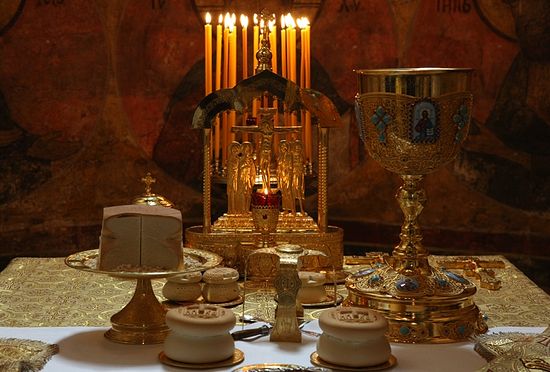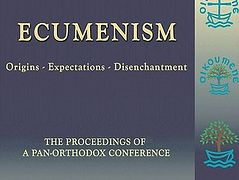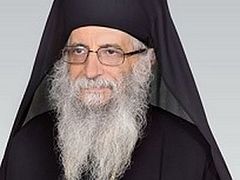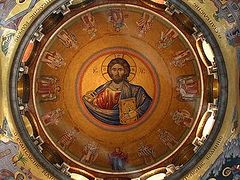In thinking through a theological question, I often engage in thought experiments. The Fathers might call it a form of theoria, but I won’t presume that word for myself. But what I do is to make a concerted effort to let go of unexamined assumptions. I look at a different set of assumptions and ask, “What if that were true?” The result many times yields a dead end. But knowledge of dead ends can be just as useful as other information. However, on occasion, the result is genuine insight, even a realization that the assumptions that have encumbered a problem are, in fact, false and unnecessary. Thinking through modernity requires many such experiments. For modernity is not a time period (even though it pretends to be). It is a set of assumptions about the world, about human beings, about history, about almost everything. And in pretty much every case, it is wrong. It is an attack on the most fundamental teachings of classical Christianity. I have written previously that there cannot really be such a thing as “modern Christianity.” It is as contradictory as Buddhist Christianity or Hindu Christianity. Modernity is its own religion.
Most recently, I’ve turned our attention to the question of the Church in modernity. For the modern world has completely re-thought the matter of the Christian Church, and the state of things today is the result. In particular, modern Christians have largely lost the ability to think of the Church as “One,” in any way that is not a vague, nebulous unity of abstraction. This is in utter contrast to the very concrete unity of the early Fathers who proclaimed the Church as “One, Holy, Catholic and Apostolic.”
So we’ll engage in a thought experiment.
Put yourself in the fourth century. There is only one Church, and that Church is One. It is united in faith, teaching, practice, communion, etc. It’s not perfect (there never has been such a thing), but it is One. If something or someone challenges that united faith, teaching, practice, communion, etc., they are themselves barred from communion. This happens not just at great Ecumenical Councils, but is the provence of each bishop and every synod of bishops. The great Councils are only necessary because the Church is One.
However, begin to think. Consider how the verse, “the Church is the fullness of Him who fills all in all” (Eph. 1:23), and what it means. In this 4th century experience, you can not only ponder this meaning in the abstract, but the very Cup you drink, and everything you tangibly know as Church, is included as well. No longer is the “stuff” of the Church interchangeable with other things. Everything about the life of the Church carries this very same fullness. You eat the fullness and breathe the fullness. When you think about the Church your conscience isn’t troubled and your sense of belonging is unshaken.
We’ll continue the experiment. Consider the word union and its cognates: union, communion, participation (it works in Greek), etc. That union means a sharing and participation but it also carries the meaning of the One. When you think of union with God (and this is the meaning of every sacramental act of the Church), you also think and understand union with the Church. The One God is made known in the One Church.
And now let’s return to the present.
The plurality of Churches (sic) makes it impossible for most people to think of the concept of the Church being One in anything other than an abstract sense. “We are one body,” cannot be said or thought without a sense of irony. And so the very word “One” begins to undergo changes. Communion (the Eucharist) is not a true communion. It can be thought of as some sort of special relation or experience of God, but if we think of it as including a true communion with His Body, the Church, that sense of irony returns and true communion necessarily disappears.
Many, of course, strongly insist on some sort of invisible reality called, “the Church.” But the Church consists solely of people, none of whom are in any way abstract. You cannot be in communion with those who do not consider you to be in communion with them, or communion becomes a form of spiritual rape. “We are One” becomes a threat or a coercive assertion. Of course, it’s easy to have communion with invisible, imaginary people. But whatever that is, it is not the Church.
And so, union and communion are largely excluded from the vocabulary of modern Christians. They are often offended by the refusal of Eucharistic “hospitality.” To visit an Orthodox Church during the Eucharist, is also to be told that you are not in communion and that something stands between you and communion with the Church. The politeness of most contemporary Christian groups creates a false communion, a participation in some minimalist version of the faith, marked by asterisks, caveats, and…irony.
There is a cosmic aspect to all of this as well, and consequences for how we think about many things of great importance. For the One Church is also the firstfruits of the One Creation. It is the single work of God “gathering together all things in One” (Eph. 1:10). That same work of union that is the “mystery hid from the ages,” is obscured in the verbal abstractions of a modernized ironic unity.
What we have to stop and see is that the churches of the modern world have been robbed of their godly inheritance. Christians in the contemporary world are simply overwhelmed by the divisions and diversity of church groups. It is completely understandable that alternative theories will appear that seek to make sense of things. Chief among these is the notion of the “invisible” Church. This account, in its various guises, simply looks at the whole mess and says that the truth is something else, obscured by human sin. “We are one!” becomes an assertion that denies our manifold divisions. But in denying them, it also relativizes them, and makes the concrete realities of our churchly existence to be of little consequence – for, after all, if we are really one, then what do all of these divisions really mean or matter?
More subtle than this, is what this abstracting does to the meaning of unity and union. Our culture has now had nearly two centuries of treating Christian unity as an abstract notion, manifest, at most, as friendliness. And this has had a concomitant effect on the meaning of union and unity elsewhere. The fact that our culture can describe a same-sex relationship as a “union” is a particularly egregious example. For such a union can have no true concrete expression. But our culture, driven by a false ideology of unity, cannot think of why such a relationship is not a union. “They love each other,” we are told. Sentiment trumps reality.
I point to this example in part to demonstrate how devastating the malformation of words and meaning can be. Union is not something that is achieved by greater and greater generalizing – it comes in greater and greater particularity and specificity. In encountering Christ, we ultimately are not asked to just do something. We are asked to do some one thing, with all our heart and soul: we die. And we do not die “in general.” Love is quite specific and concrete or it is nothing at all.
And so, I bring us to the point. My writing painfully about the meaning of union and the One Church, is not to argue about the status of various Christian “Churches.” There is no accusation nor calumny intended. Rather, it is first to return the meaning of “One Church” to its proper place, with all of the pain and scandal that attends it. The One Church is ultimately found in One Cup, and there, only through true repentance and acceptance of the fullness of the faith. And if we are not there, then at least we must say so and cry out to God. He gives grace to the humble and resists the proud. It is beyond arrogance to say we are one when we are not. There can be no communion in a lie, or only a communion of death.
Christ prayed that we “all may be one,” even as He and the Father are one. That cannot be a vague, ephemeral notion. It must be real, true, concrete and without irony. But Christ did not pray “that they all may be one someday…” His prayer was not an expression of a hoped-for reality. It is His own great Eucharistic prayer in which the Church becomes One. For what He asks, the Father grants. Just as surely as we pray for the Holy Spirit to “make this the most precious Body of our Lord, and God, and Savior Jesus Christ,” and so it is – so the Church became One in that Eucharistic Prayer of Christ Himself.
It is a prayer that will indeed have an eschatological fulfillment: “All things will be gathered together in one…” But in Christ, the Eschaton has already come. We may eat and drink of that One and become the life of the One fulfilled in this world. But it will not be true if we choose to distort the very meaning of the word.
Don’t ignore the pain.




